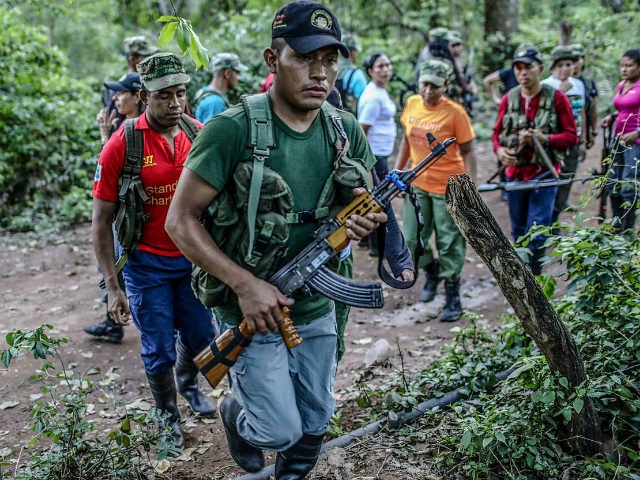The Colombian government is preparing to reintegrate members of the FARC Marxist narco-terrorist group into its society as they undergo their first round of rehabilitation. FARC terrorists continuing to stage bombings and kidnappings have marred the process, however, which the Colombian people voted against last year.
The national outlet Caracol Radio reported on Monday that Revolutionary Armed Forces of Colombia (FARC) terrorists had abducted two ranchers, brothers Carlos and Jeferson Pineda, taking them to an undisclosed rural location from San Vicente del Caguán, Caquetá. Officials described the abductors using the Colombian government’s apparently preferred term “FARC dissidents,” meaning FARC terrorists who are not abiding by the peace deal Bogotá signed with FARC leaders in Havana that would enable the leaders to establish the FARC as a political party.
The Colombian newspaper El Tiempo notes in its report on the Pineda brothers that FARC “dissidents” had also recently planted explosives on a road near which military vehicles were scheduled to pass in an attempt at attacking the government. The bomb went off shortly after a military vehicle transporting soldiers passed through the area. While neighbors did not report any injuries, the attack resulted in serious property damage for locals.
The highest-profile attack conducted by FARC “dissidents” in protest of the peace deal, which would likely result in a high number of members of the terrorist group not serving time in prison for their crimes, occurred on May 3. Members of a group calling themselves the Armando Ríos First Front of the FARC-EP (Ejército del pueblo, “People’s Army”) abducted a United Nations employee identified as Harley López, a member of the United Nations Office on Drugs and Crime (UNODC).
The FARC faction involved mailed a letter to radio stations Caracol and RCN with a list of demands for the release of López two days after his abduction, calling for the liberation of a FARC leader known as “Simón Trindad” and a guarantee that the government and the United Nations will not crack down on coca growers.
The FARC largely subsists off of cocaine trafficking, and some factions within Colombia fear that the peace deal benefits leaders exiled in Havana at the expense of the interests of guerrillas still operating in rural Colombia. The First Front, the BBC notes, rejected the peace deal in July 2016.
The UN Center of Information in Colombia confirmed the kidnapping and demanded López’s “immediate and unconditional” return on May 11, as well as adding the detail that López’s job in the region was to help replace coca crops with legal agriculture to ensure that the legalization of the FARC does not impoverish the farmers whom the FARC has held captive to their markets for their half-century of existence. President Juan Manuel Santos, who won the Nobel Peace Process for his negotiations with the terrorist group, has personally participated in initiatives to replace coca crops.
The single statement and apparent lack of urgency on the part of officials to negotiate the release of López triggered condemnation from the NGO Amnesty International, whose Americas Director Erika Guevara-Rosas noted in a statement published on May 8:
The silence of the government and the FARC in relation to this serious incident and to the critical security situation in the country in general is worrying. If the necessary conditions for the local implementation of the peace agreement are not guaranteed, the results could be devastating for the communities, civil society organizations and international bodies involved in this process.
In a national referendum last year, Colombians voted against implementing a peace deal with the FARC, which would allegedly end the over 50-year-old conflict between the terrorist group and the government. Santos pushed the plan through Congress anyway, by mislabeling it a treaty to override the constitutional requirement for a referendum vote in its favor.
The plan would require all FARC terrorists to hand over their weapons to the government and be placed in designated “rehabilitation centers,” where they will be evaluated medically and psychologically and prepared for a return to civilian life. A special FARC tribunal will judge the crimes of every terrorist, and only those found guilty of “crimes against humanity” – not “political crimes” – will serve prison time. The government and FARC did not clarify what kinds of crimes would fall under either of those categories.
As many FARC terrorists were abducted as children and turned into child soldiers, many suffer intense trauma and brainwashing and require intense psychological help. The FARC leadership that enabled their abduction and brainwashing, however, remains comfortably established in Havana and will be allowed to pursue the creation of a FARC political party in Colombia, using the millions of dollars in cocaine sales, ransoms, and other illicit funds to strengthen the party.
An estimated 6,900 FARC members have congregated at rehabilitation points nationwide to be processed by the government, though some groups, now labeled “FARC dissidents,” have refused. Other criminal groups in the region, like the Brazilian drug gang First Capital Command (PCC), have begun recruiting former FARC terrorists into their ranks who do not wish to disarm, according to reports.

COMMENTS
Please let us know if you're having issues with commenting.